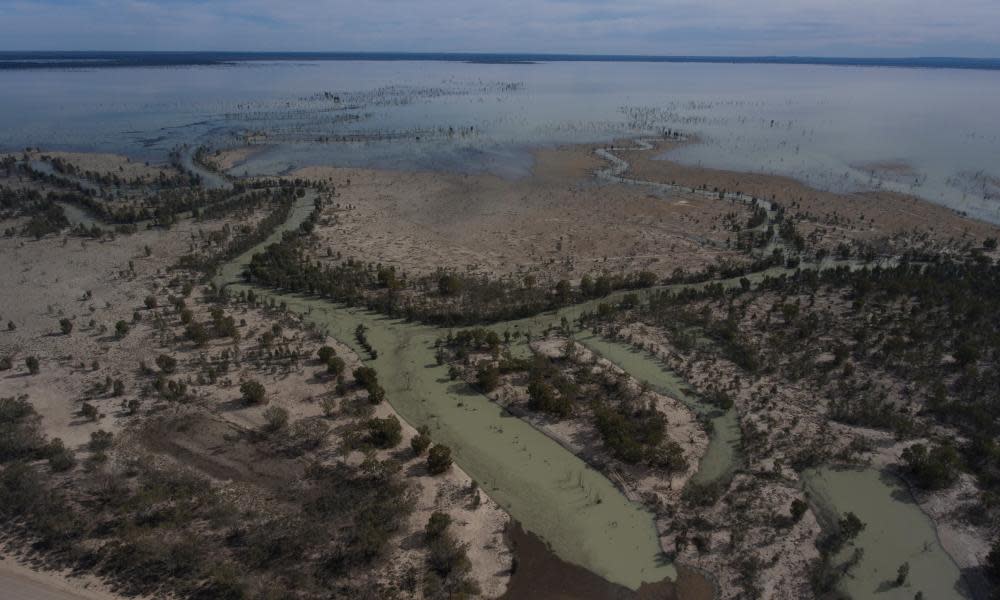NSW Nationals plan to let north coast farmers take more water raises risk of towns running dry, MP claims

The New South Wales Nationals have announced a plan to triple water capture for farmers on the north coast in a move it is claimed will strip billions of litres from coastal rivers and increase the risk of communities running dry in future droughts.
The water minister, Melinda Pavey, has changed regulations which will now allow farmers on the north coast to take 30% of the water falling on their land instead of 10%. The water is usually stored in dams, but affects the amount of water reaching rivers.
The plan is aimed at delivering more water to agriculture on the north coast by increasing rights to harvest water while ramping up a campaign to get major changes to the Murray-Darling Basin plan.
Pavey told the Guardian the change was to address a historical decision in 1993 that applied the same rules on water harvesting across the eastern and western sides of the great dividing range. She said there was three times as much rainfall on the eastern side of the range.
Related: Traditional owners in Murray-Darling Basin take fight for water rights to governments
But the independent state MLC Justin Field said a tripling of water harvesting rights would strip billions of litres of water from NSW coastal rivers from the Bega to the Tweed and increase the risk of coastal communities running out of water in future droughts.
He said it was a gift to blueberry farmers and other intensive agriculture on the north coast of the state, where the Nationals hold several seats.
“Many coastal communities remember what it was like in the last drought when coastal rivers had almost no freshwater flows. It means they are more likely to run out of water in the next drought,” he said.
Separately, in an interview with the Daily Telegraph, Pavey said on Thursday that the Murray-Darling Basin plan demanded water savings that “just weren’t possible”, signalling that she was intensifying her campaign for concessions under the plan.
“Locals told us from the start this was wrong and they were right,” she said.
“We’re still committed to achieving water savings but we can’t do what the federal government and other states were asking us to do because it was environmental vandalism,” Pavey said.
NSW was required to deliver around 340 gigalitres in water savings under the part of the plan which required water savings through efficiency projects.
Its major project, the Menindee lakes water saving plan, which pre-dates the current minister, had been roundly condemned by water experts, environmental scientists, Indigenous people and the local town as unachievable.
It was slated to deliver 106GL through shrinking the lake system and reducing evaporation but came under fire during the drought, when the early emptying of the lakes meant there were no reserves to continue flows in the lower Darling, leading to fish kills.
A new proposal for the lakes being floated by Pavey would deliver only a fraction of this – between 20 and 40GL – though estimates vary. This would leave NSW short on meeting its remaining contribution to the plan.
Under the plan, a failure to meet the target in 2024 would result in more water buybacks, a more cost-efficient measure but one that would harm agriculture.
Email: sign up for our daily morning briefing newsletter
App: download the free app and never miss the biggest stories, or get our weekend edition for a curated selection of the week's best stories
Social: follow us on YouTube, Facebook, Instagram, Twitter or TikTok
Podcast: listen to our daily episodes on Apple Podcasts, Spotify or search "Full Story" in your favourite app
In June, the Nationals in Canberra surprised their Coalition colleagues by introducing amendments in the Senate to change the Murray-Darling Basin Act to ban the government from buying back water from farmers to return it to the environment.
They also demanded the removal of a separate requirement that an additional 450GL be returned to the river unless it achieved “neutral or improved socio-economic outcomes”.
And they wanted a commitment that no further water be taken when the basin plan concludes in 2024.
There had been speculation that these water demands had been pushed by the Nationals in their discussions with the Liberal party in a deal to secure support for a net zero emissions target by 2050.
A spokesperson for the Nationals leader, Barnaby Joyce, said they would not be commenting and would be announcing elements of the net zero agreement with their Coalition partner over coming weeks.
The amendments moved in June were not supported by the Liberals and had not progressed.

 Yahoo Movies
Yahoo Movies 
